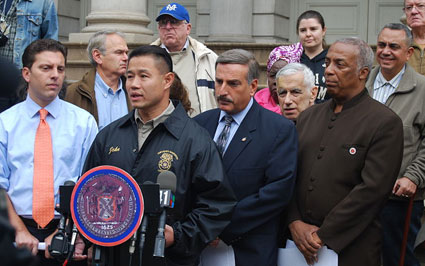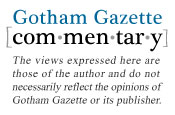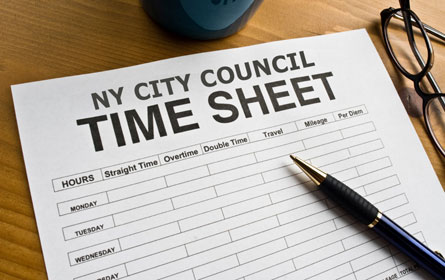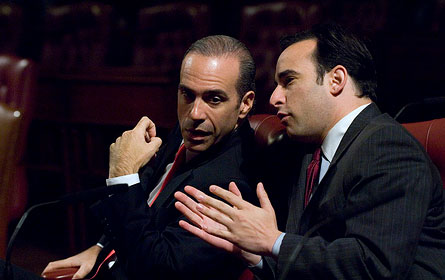Once Again, Term Limits Goes to the Voters

(This is the second article in a series of commentaries Gotham Gazette will run between now and Election Day on the charter proposals appearing on the November ballot.)
The issue of term limits has been a political hot potato in this city for the past 20 years. It has pitted the public against their elected officials and done significant damage to our democracy in the process. The latest chapter in this story will take place on Nov. 2 when voters will yet again get an opportunity to decide whether they want their city elected officials to have two or three terms.
That question and a number of others were put on the ballot by a Charter Revision Commission appointed by Mayor Michael Bloomberg this past March. The Charter Commission was created in the aftermath of the controversial decision by city elected officials to extend term limits to three terms in 2008. This action overturned the will of the people as expressed in two public referendums on the subject. In the first referendum, in 1993, the voters overwhelming expressed their support for a two term limit for all city elected officials. Not satisfied with that answer, the City Council in 1996 put another referendum on the ballot that would extend term limits to three terms. The voters soundly rejected that suggestion.

This tumultuous history formed the backdrop for the work of the 2010 Charter Commission. Although the Charter Commission was charged with performing a top-to-bottom review of the New York charter, its first obligation was to address the term-limits question. I was one of the 15 members of the Charter Commission, and ironically, one of the few members who supports the general idea of term limits. However, regardless of their own personal beliefs, most members of the Charter Commission believed that, given the prior referendums and the public outrage over the way things were reversed in 2008, it was vitally important to our democracy for the voters to have an opportunity to settle this issue once and for all.
Although the term-limits issue will appear on the ballot as a single measure -- Question 1 -- actually is comprised of three separate questions, not one. The Charter Commission lumped them together as one question due to space limitations imposed on us by the Board of Elections. (The board has subsequently denied any such limitations, but that's the subject of another story.) The three parts of Question 1 attempt to address the public's request for a final, binding say on the issue of term limits for city officials. My belief is that we went a long way toward accomplishing that goal, but we failed to finish the job.
I believe that we did get it right on the first two parts of Question 1. Part one of the question gives voters the chance to decide whether we should return to a limit of two terms for all city elected officials. If the electorate rejects going back to two terms, then the current three-term limit will be retained. Part two of Question 1 would prohibit the City Council from altering the terms of elected officials currently holding office. This means that council members can only modify the term-limits law for future city officials, and not for themselves. In many respects, this closes the "loophole" that caused so much public outrage in 2008.
But it is part three of Question 1 that sparked the most debate and disagreement within the Charter Commission. That part provides that the proposed change back to two terms would apply only to city elected officials who were first elected at or after the 2010 general election. In other words, all incumbents who are not already in their third terms would be "grandfathered in" and will have the opportunity of serving three terms. Since the next City Council election will not take place until 2013, the two-term limit would not fully take effect until 2021.
It's my contention that this essentially creates a new "loophole" that will only perpetuate the public's lack of faith in government. It is also logically inconsistent with the other parts of Question 1. If we are providing the public with an option of two terms because of the outrage and loss of trust that was engendered by the 2008 change, then why would we extend this questionable windfall?
As stated in a Minority Report that I authored along with two fellow Charter Commissioners, "The 2008 change from two terms to three was made effective immediately. The change back from three to two -- if the voters approve it -- should be no different. Elected officials are not entitled to a certain number of terms. We see no justification for exempting any elected official from the two-term limit, should the voters reinstitute one."
I am not an advocate for government by referendum. We have all seen the chaos it has caused in California. We live in a representative democracy, and it works well for the most part. However, there are some areas of government that are so vulnerable to self-interest and self-dealing that the only way to bring about change is through a public referendum. For example, the City Council can currently raise its own pay. How many people believe it should have that right or that it will ever give up that power on its own accord? Similarly, incumbents will never willingly reduce their own terms, even if it means defying the will of the people who elected them.
That is why despite my own reservations about the effective date of the term limits provision, I strongly support it and urge voters to vote yes on ballot Question 1. It's an important first step toward reversing what happened in 2008 and restoring some of the trust that was lost along with it. Hopefully in the next year either a new charter commission or a public referendum will eliminate the exemption for incumbents and finish the job we started.
Anthony P. Cassino, a lawyer who lives in the Bronx, was a member of the 2010 Charter Revision Commission.
Full-Time Council Would Better Serve New Yorkers

We want and expect our City Council members to be the best and brightest our city has to offer, but it is becoming harder and harder to expect top-of-the-line professionals to choose public service. A recent Gotham Gazette article reported that many City Council members earn outside income, with some making substantial amounts. This suggests that New York City's council members should be full-time city employees. Such a change would go a long way to truly reforming our city government.
Currently, council members make $112,000 per year (I'm one of a handful of council members who doesn't receive a "lulu" for chairing a committee); our city's absurd tax burden just about cuts that in half. I own my home in my district, and that is an expensive undertaking even by New York City standards. By no means am I asking for sympathy, I feel that I’m a lucky one -- I live comfortably, and I'm very thankful for that.

Millions of New Yorkers no doubt pay their bills while earning less than their council member makes. Even though council members do have to disclose their incomes, the salary ranges they report have enormous variation -- sometimes hundreds of thousands of dollars. You could throw a dart at a board with random salaries on it and make a better guess at what your council member earns moonlighting.
A Council Member's Job
Rather than have all this vague disclosure, the city should mandate that council members put in 40-hour weeks to enable them to provide true, full-time constituent services. Along with that, the city should increase the pay for the position. We should have to fill out time sheets just as our subordinates do and account for our time. Of course, some of the members already devote far in excess of a 40-hour week to their districts and the city, and for that, I am grateful.
We need to make an investment in our city's legislative body that will ultimately make the council stronger and more responsive to the people. I consider myself a full-time council member, working over 60 hours a week for District 19. I come to my council office every day and go to every council meeting and attend meetings for six different committees. I meet with community leaders and constituents throughout the morning, deal with office matters and travel around my district and the city to events in the late afternoons and evenings, including weekends. My district office is open on weekends and has a late night each week to better serve the varied schedules of my constituents, and we also are available on the web; I even update my major events and happenings on Facebook and Twitter to keep people informed.
In saying this, I'm not digging for compliments. As I see it, I'm just doing my job. But technically, the role of council member is only a part-time position. Many of my colleagues work full- or part-time elsewhere, and who can blame them? They are accustomed to earning more than their council salaries in the private sector, and it's perfectly legal (assuming they avoid conflicts of interest, of course). And for many, the extra work is necessary to make ends meet.
The Full-time Advantage
Making the job full-time would give New Yorkers the complete attention from their elected officials that they deserve, and constituents would notice the difference. Council members would be more active in the community and be more hands-on in addressing their constituents' concerns. Leaders in business, law and other fields would be more inclined to run for public office and the entire city would benefit from the dedication.
Dozens of city department heads make over $200,000 per year, as well they should. They are top-shelf leaders and professionals who run complex agencies, supervising hundreds or thousands of personnel. Executive-level talent will earn at least twice this much, if not far more, in the private sector. And running New York City's bureaucratic, heavily regulated and sometimes archaic government is as challenging as any job you’ll find in the courtroom or on Wall Street.
We've seen the conflicts of interest that occur when elected officials run businesses on the side. For example, former Senate Majority Leader Joe Bruno was taken down by the blurring of the lines between outside income and political influence. It is not even the actual scandal or wrongdoing that will happen no matter how careful we are; a move toward full-time legislators would provide an atmosphere where even the very appearance of impropriety could not survive because influence peddling would have been largely stamped out.
Our public servants would be fully invested in one thing: public service. The time has come to ask our elected officials to make a full time commitment to the city and in turn, have the city make a full time commitment to them. It's about good government, it's about focused leaders -- it's about time.
Daniel J. Halloran, a Republican, represents Queens 19th District in the New York City Council.
Republicans, A Call to Arms

Five for fighting?
Not so much.
Go along to get along?
Don’t expect that either.

With the growth of the Republican delegation to five members and a potential shift further to the left in the rest of the City Council, increasingly folks are realizing that the Republican delegation I proudly lead is positioned at the crossroads of city government and as such will play a larger role in the goings on at City Hall.
If you are a fan of democracy, you should welcome this turn of events, as it will result in greater and more substantive debate and a louder, stronger voice shared by hundreds of thousands of New Yorkers (dare I say even more than that?).
Historically, and still true today, the City Council has not had the level of partisan vitriol that has played out in Albany and our nation’s capital. Perhaps that's because it's a unicameral legislature. Or, more bluntly, maybe it's because in the modern council there have been so few Republicans there was a need for us to simply coexist to exist. Whether it was Tom Ognibene and Peter Vallone Sr., or Gifford Miller, current Speaker Christine Quinn and I, the leaders of the two major parties in the council more often than not have found a way to transcend ideological differences in order to strive for common ground, coalitions and consensus.
There is great value in bipartisanship but make no mistake, those of us on the other side of the aisle have never been shrinking violets. In Joseph Heller’s stirring 1979 political novel, "Good as Gold," Ralph, a presidential aide, tells a job applicant, “This president doesn’t want â€yes’ men. What we want are independent men of integrity who will agree with all our decisions after we make them.”
That will not be the 2010 incarnation of the Council’s GOP delegation. (Not that anyone who has been following the council, even in a cursory way, needs to be convinced of our approach.)
A Middle Class Agenda
For years, we have talked about the need for genuine structural fiscal integrity, focusing tax dollars on essential services and not having a city government that attempts to be all things to all people from cradle to grave. We have voted against tax increases at every turn, rejected misguided legislation that hurt small business and tried to ensure our actions reflected a sensitivity to a precious, yet threatened resource in New York City -- the hard-working middle class, who find it tougher and tougher to pay their bills, provide for their families and have a decent quality of life.
Sometimes we did it with humor, and at times with anger, and there was even one occasion where we did not get past the first course at a dinner at Gracie Mansion because we thought a statement needed to be made. But perhaps now, as a five-man delegation that will speak in a respectful, informed voice, we can team with an emboldened cadre of like-minded Democratic allies, who also have grown weary of seeing their constituents pay too dear a price for a city government that seems to take them for granted and taxes them into the ground.
While I believe that our words and deeds in the past have impacted the direction of this council in a positive way, we genuinely hope that in the coming term the positions of this delegation will be viewed as more than just a token protest vote.
Rather, it is our goal to make the most of the burgeoning influence of a coalition of centrist council members who are willing to stand up on behalf of taxpayers and small business owners who are under siege. We will be needed to enact legislation. We will be needed to stop counterproductive legislation from being passed. We will be needed to override bills or to stop bills rightly vetoed from being overridden. In short, true progress won’t happen without us and we will not squander the opportunity we have to effect change.
A quick example to illustrate my point.
In March 2004, I took to the floor of the Council Chambers amazed that all of my colleagues were seemingly nonplussed that we were about to enact a budget modification that in part was being implemented to allocate an additional $250 million dollars to the city’s Medicaid responsibilities. There was nary a peep! This from the same group of learned colleagues who literally spend weeks and months in hearings questioning agency heads, in budget negotiating team meetings debating the efficacy of just about every individual program the city institutes, and dare I say arguing in borough delegations as to what should be reflected as their priorities in the budget process. All this time and energy dedicated to a process, at the end of which, the council shifts only slightly more money than the aforementioned Medicaid budget modification that, but for my rant, would have gone without comment.
For too many of my colleagues, feeding the Medicaid monster a quarter of a billion dollars midyear was so acceptable as to not even warrant a query. Perhaps, this is why Medicaid and its three ugly “uncontrollable” sisters (pension and health care costs for city employees and debt service) have grown some 77 percent in the last eight years and are in large measure what is driving the daunting budget gaps we face for the next several years. It seems too often, the council forgets that it is a zero sum game and that every dollar spent on “A” is one less dollar available for police officers, firefighters, sanitation workers, etc. More frustrating at times, is the simple truth that many members have very different priorities and their definition of “essential” services differs greatly from many New Yorkers.
Healthy Debate
It is the hope of this delegation that a healthier debate on this question will now ensue and decisions that are currently foregone conclusions and the result of what appears to us as reflexive, typical knee jerk reactions, will now have to be enacted after a fuller discussion in which Democrats and Republicans challenge the all-too-accustomed orthodoxy of the council.
We genuinely respect all of our colleagues regardless of political affiliation. Many of us in the council want to get to the same destination, but differ passionately on the route we take to get there. We appreciate that unlike the minority parties in other legislatures, we have been treated fairly and have been welcomed as vital members of this institution. We look at the happenings in Albany and thank the Lord we serve in an institution where getting the people’s business done is what matters, not the letter on our voter registration cards.
Speaker Quinn has continued and enhanced the standard set by Peter Vallone Sr. and Speaker Miller and has encouraged us to speak as forthrightly as we want. We have complex and difficult challenges ahead. We look forward to working with all 46 of our colleagues in fulfilling our duties and responsibilities.
James Oddo represents City Council district 50 on Staten Island and is the council's minority leader.




